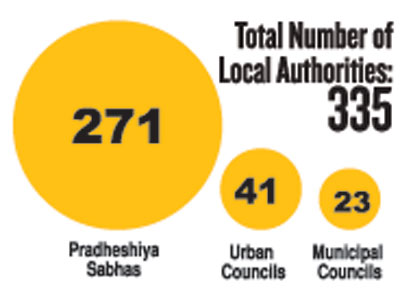News
Comatose local bodies paralyse public services
View(s):Numerous services that the people expect from their local officials are not being delivered — the result of delays in holding the long overdue elections to 335 councils.
 Approvals for building of homes and garbage collection are only a few of these services that are not being carried out.
Approvals for building of homes and garbage collection are only a few of these services that are not being carried out.
In Valikamam, north of Jaffna, where hundreds of lands were released by the military for the resettlement of internally displaced people, there have been setbacks to infrastructure and regional development because the local body ceased to function two years ago.
Somasundaram Sugirthan, the former chairman of the Valikamam North Divisional Secretariat, said this was because there were no elected representatives. ‚ÄúIn Palaly, at least eight by lanes scheduled for development last year were approved. The council called for tenders after a year had passed,‚ÄĚ he said.
The Divisional Secretariat appointed a panel of advisors made up of civil society representatives as an alternative. The panel is consulted for community development and local infrastructure projects.
‚ÄúAs a region that contains many resettlement areas under our purview, we need more funding to develop local infrastructure. Only 40 percent of the local roads and bylanes have been developed. We are expecting more funds from the government, urgently,‚ÄĚ R Baheerathan, Valikamam North Divisional Secretary, told the Sunday Times.
In Colombo, the adverse impact is greater. There were complaints galore over mounting garbage dumps and lamp-posts without lamps.
Danasiri Amarathunga, former mayor of the Dehiwala-Mount Lavinia Municipal Council, which was dissolved 10 months ago, said the council’s activities have come to a “standstill’ without the political representatives.
‚ÄúCurrently there is no command structure to monitor the activities of various departments in the council. Employees are not taking orders from the secretary since he is just a public servant. There is no one to question them.”
He said delaying local polls is the worst thing the Government could do to the people.
There are 29 councillors in the Dehiwala and Mount Lavinia municipal council. As elected representatives, they take up issues faced by residents at the grassroots level. Among the 335 local bodies in the island that have not been functioning for more than a year, there are two local bodies in the Mullaitivu District, which have not had elected political representatives for nearly three decades.
They are the Puthukudirippu and Maritimepattu local councils where a lawsuit is still pending in the Court of Appeal over the holding of elections. The Mullaitivu district’s Assistant Local Government Commissioner Sulochana Muruganesan said she believed that without political representation at the grassroots level there would be no healthy discussions on development, or anything else.
“When there is an elected body, there is much scope for discussion and mutual understanding of people at the grassroots level through their elected representatives. Otherwise, it would be a ‘one man’ show when a secretary of the particular division makes decisions,‚Äô‚Äô she said.
Elected councils could be examples of how checks and balances could be exercised at the grassroots level, by questioning the Government and its actions. In some instances, critical decisions on local development work are put to a vote, and various committees are appointed to examine local issues.
Last week, the Cabinet was informed that a bill consisting of amendments to the technical errors in to the Local Authorities Elections Act No of 22 of 2012 would be submitted to Parliament and another key amendment would be incorporated at the committee stage.
While making observations regarding some sections of the proposed amendments, the Attorney General’s Department informed the Ministry of Provincial Councils and Local Government that the bill should be enacted with the specific majority of the Parliament in terms of Provision (a) of Article 75 of the Constitution.
Meanwhile, the Elections Commission has informed the ministry of a technical error in to the Local Authorities Elections Act over procedures of nominating candidates for multi-member wards determined by the National Delimitation Committee, and this might affect the holding of local polls.
“Under section 28(2) of the Act, provisions for nominating candidates for multi-member wards are included. It has been provided for a single party to nominate two candidates for a multi-member ward consisting of two members and three candidates for a multi-member ward consisting of three members. However, this has been indicated in the format for nominations included in the schedule relevant to that section, as single party to nominate only one candidate for multi-member ward,” the Cabinet memorandum submitted by the Local Government Minister seeking approval for the correction noted.
Accordingly, following Cabinet approval, the legal draftsman has been instructed to draft an amendment at the committee stage in Parliament providing two candidates for a ward consisting of two members and three candidates for ward consisting of three members from each political party or independent group.
The People’s Action for Free and Fair Elections, an election watchdog, alleged that moves to further postpone local polls is a violation of the democratic rights of the citizens. ‚ÄúThis is bad practice for a democratic society. The government at least informed the public of time frames of polls,‚ÄĚ head of PAFFREL, Rohana Hettiarachchi said.

